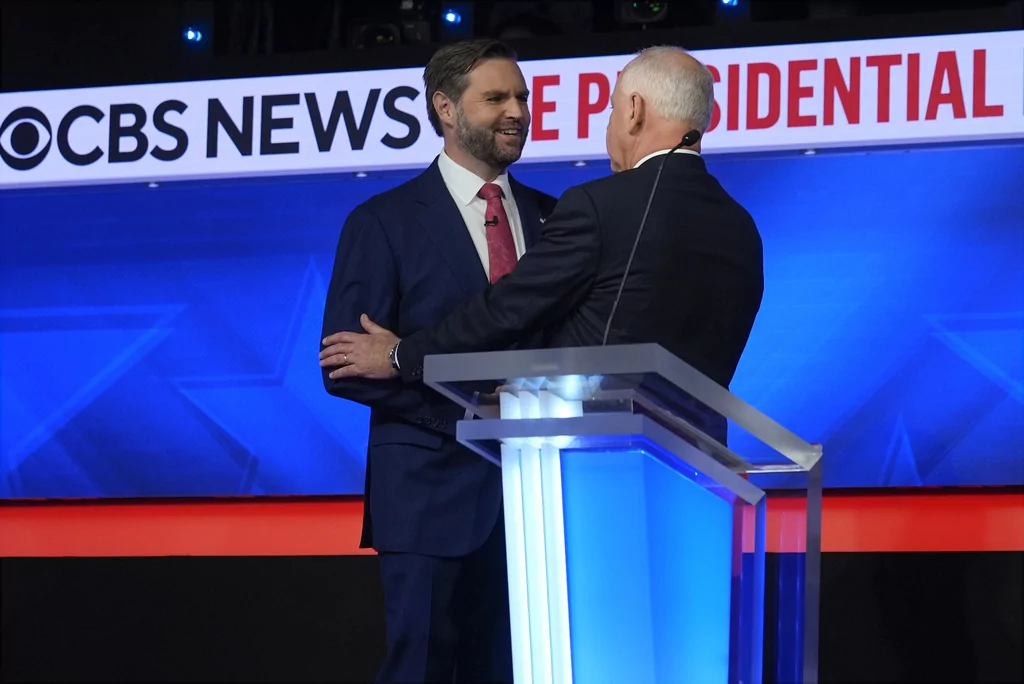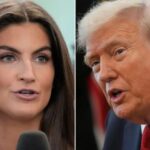

Vice presidential nominees Gov. Tim Walz (D-MN) and Sen. J.D. Vance (R-OH) had one responsibility during their first and only debate, and potentially the last head-to-head of the 2024 election.
That responsibility was to “do no harm” to Vice President Kamala Harris and former President Donald Trump one month before voters cast their final ballots when the two presidential nominees are within the margin of error nationally and the cycle’s seven battleground states.
Pollster Berwood Yost underscored how vice presidents try to help the top of the ticket during their debate, while putting down their opponents, with their success measured against how well they communicated their campaign’s messaging and priorities, in addition to any new concerns they raise about their opponent’s policies or capacity to lead the country.
“But the main rule for both candidates is ‘do no harm,’” Yost, director of Franklin & Marshall College’s Center for Opinion Research in Pennsylvania, told the Washington Examiner.
Here is how experts graded Walz and Vance’s 90-minute, more substantive debate on CBS in New York City:
Walz: B-
Walz, a two-term governor, six-term congressman, former social studies teacher, and one-time football coach plucked from relative political obscurity by Harris to become her vice presidential nominee, in part, because of his Midwest “aw shucks” folksy persona and appeal, attempted to temper expectations before the debate, with the Harris campaign pushing stories about his inexperience and nerves ahead of this match-up against Vance.
But although Walz has a reputation for his plainspoken “Minnesota nice” responses in TV interviews, from “mind your own damn business” to describing Trump and Vance as “weird,” the governor appeared out of practice at the start of the debate after being protected by the campaign since his nomination.
During the first question about Iran‘s missile attack on Israel, Walz had difficulty with the word “Israel” before criticizing Trump’s “fickle” leadership and lack of endorsements from his former aides, including his comments earlier in the day downplaying troop injuries caused by Iran’s strike on Al-Asad Airbase in Iraq in 2020.
On immigration, Walz said: “Most of us want to solve this … that’s why we had the fairest and toughest bill on immigration that this nation has seen.”
“Donald Trump said no, told them to vote against it because it gives him a campaign issue,” he added. “What would Donald Trump talk about if we did these things?”
Walz appeared rattled when asked about his contradictory statements regarding his time in China, amid other scrutiny over his misstatements related to his military record, as well as liberal policies he supported as governor, such as his reaction to riots over George Floyd‘s death in police custody in 2020.
“I’m a knucklehead at times,” Walz said about saying he was in China during the Tiananmen Square protests and massacre when he was in Nebraska. “All I said on this was as I got there that summer and misspoke on this, so I will just, that’s what I’ve said. So I was in Hong Kong and China during the democracy protests.”
University of Michigan debate director Aaron Kall graded Walz with a B- because he “did a good job of trying to divide Trump and Vance by putting a lot of distance between them and talking about places where they disagree and criticize each other,” particularly concerning Jan. 6.
“Like Harris, [he] was very strong on the issue of abortion,” Kall told the Washington Examiner. “Talked about a lot of specific heartwarming examples and tied the issue to IVF, which impacts him personally.”
“Spent much more time attacking Trump at the top of the ticket, as opposed to Vance,” he said. “He actually had a lot of positive things to say against his opponent, which helps his bipartisan bonafides he stressed from his time in Congress. Started out very nervous while furiously scribbling a lot of notes. There were several awkward pauses during the debate and the split-screen shot was unfavorable as he directly stared at Vance for extended periods of time.”
Ed Lee, director of Emory University’s Alben W. Barkley Forum for Debate, Deliberation, and Dialogue, was harsher, giving Walz a C+.
“It was not good for the debate to start off with a foreign policy question,” Lee told the Washington Examiner. “He was shaky for several questions. This is not the best medium for Walz’s to communicate his ideas. He is not doing a good job creating a space between Harris and [President Joe] Biden so she can be seen as an agent of change. That should be his primary objective.”
“I thought he was good on climate change and great on abortion,” he said. “Reproductive rights is where he needed to be great and he was. Walz framing of the issue as a ‘right’ that should not be undermined by geography was powerful and compelling.”
Democratic strategist Stefan Hankin conceded Vance performed “better than expected,” but that he had a “low bar.”
“Walz fine but not great,” Hankin told the Washington Examiner. “Overall nothing that is likely to change minds.”
Republican strategist Cesar Conda thought Walz deserved a “D-minus” for being nervous at the start and struggling to regain his ground.
“CBS called him out for lying about being at Tiananmen Square and he could only say he ‘misspoke,’” Conda told the Washington Examiner. “Lame.”
Vance: A-
Vance, the Ivy League-educated first-term senator, best-selling Hillbilly Elegy author, former venture capitalist, and Marine Corps veteran, had higher expectations and pressure as Trump’s campaign continues to be eclipsed by Harris’s with fundraising and volunteers — and after Trump’s own debate against Harris on ABC in Philadelphia earlier last month, including his claim that Haitian migrants were eating pets in Springfield, Ohio.
Vance, who could be a potential presidential candidate, also had to overcome his historic vice presidential nominee unpopularity after his nomination coincided with the recirculation of 2021 comments in which he said the Democratic Party was led by “a bunch of childless cat ladies.” Vance, a former Trump critic who has occasionally been out of step with the one-time president on policy, has defended himself against the criticism, contending Democrats are “anti-family and anti-child.”
But Vance, who has been proactive in speaking with reporters, appeared more composed during the debate, seeming concerned with improving his favorability-unfavorability rating by reiterating his biographical information and repeatedly mentioning his children. He, too, was able to use his answers to make comparisons between Trump and Harris in a manner the former president could not do for himself.
“Iran is as close to a nuclear weapon today as they’ve ever been,” Vance said. “Gov. Walz, you blamed Donald Trump. Who has been the vice president for the last three-and-a-half years? The answer is your running mate. Not mine. Donald Trump consistently made the world more secure.”
But the senator did disagree with the moderators over the legal status of Haitian migrants in Springfield, ending with the moderators muting his microphone after he spoke over them.
Pollster Frank Luntz held a focus group with voters throughout the debate who by a 12-2 margin were in favor of Vance at the conclusion.
Final focus group vote tonight after the #VPDebate: 12-2 in favor of JD Vance pic.twitter.com/LgahO2za7C
— Frank Luntz (@FrankLuntz) October 2, 2024
On abortion, Vance conceded Republicans needed “to do so much better of a job at earning the American people’s trust back on this issue where they, frankly, just don’t trust us.”
“That’s one of the things that Donald Trump and I are endeavoring to do,” he said.
Kall graded Vance with a B+ after he started the debate acknowledging both nominees are not well known nationwide and used the opportunity to introduce himself, with early topics, such as the Middle East, the Iran deal, and the economy, advantaging Trump and the senator.
“Did a much better job than Trump of defining Kamala Harris as the incumbent and blaming her for not doing enough on immigration for the first three-plus years of the administration — even referred to it as the Harris administration,” he said. “Would probably have earned an A-, but thought it was a mistake to criticize the female moderators for fact-checking on the Springfield, Ohio issue. Especially given his previous comments on childless cat ladies.”
But Lee did give Vance an A-, describing him as “smooth and quite eloquent” and praising him for “his ability and willingness to point out places where he agrees with Walz in order to focus the debate.”
“He sounds reasonable and empathic,” Lee said. “He is successfully refuting the argument that he is ‘weird’ and can’t be trusted. I thought he was great on immigration and defending Trump’s economic record. So good on acknowledging Walz’s son being impacted by gun violence. While the pivot on abortion to family support is strategic and wise, it does indicate that Trump and Vance know that they are way behind on this issue and it could cost them the election.”
CLICK HERE TO READ MORE FROM THE WASHINGTON EXAMINER
Conda, the Republican strategist, was more generous, with an A+ for Vance for debating Walz and the two moderators “and winning.”
“He was especially effective in describing Harris’s total failure at securing the border,” he said.






